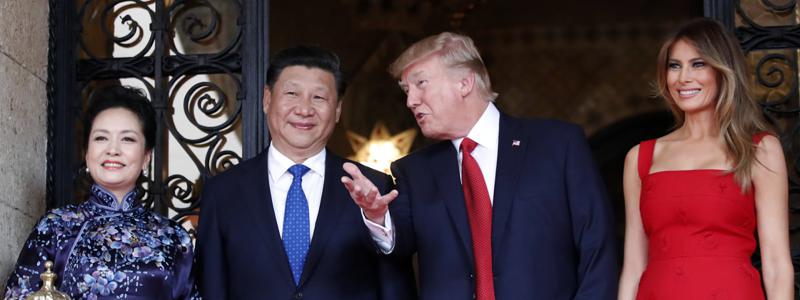
President Donald Trump talks with Chinese President Xi Jinping, with their wives, first lady Melania Trump and Chinese first lady Peng Liyuan as they pose for photographers before dinner at Mar-a-Lago, Thursday, April 6, 2017, in Palm Beach, Fla. (AP Photo/Alex Brandon)
U.S. President Donald Trump will visit China as part of his 12-day Asian trip beginning on Friday. He will travel to Japan, South Korea, China, Vietnam, and the Philippines from November 3 to 14.
We are two decades, eight days, and light-years politically away from U.S. President Bill Clinton’s triumphant 1998 visit to China. When Clinton went for a ten-day trip, China was just entering the WTO (World Trade Organization) and promised to become like America within a reasonable timeframe, before overtaking of the U.S. in GDP, as was then already foretold by futurologists.
Today China is at a rock shot from that overtaking (in five or ten years). Yet, Beijing has not become like the USA, nor did it collapse as some skeptical hawks had bid. China is a different animal, unclassifiable according to known patterns, but also viewed increasingly as dangerous and arrogant in the region. So Trump reduced his stay in China to a couple of days and squeezed it within a 12-day trip to other important players in the region, meaning: China to us is as important as anybody, just as Japan, South Korea, Vietnam, or the Philippines.
The stakes are different than twenty years ago. In exchange for a commitment, then just signed with the WTO, to become “just like us”, Clinton guaranteed China honor and military-political protection in the region.
Today, Beijing thinks it no longer needs U.S. protection in the region or in the world but still needs a long period of peace and a lack of turmoil to continue its development, and to make that famous overtaking. But it is unclear whether today the United States or large and medium regional powers such as Japan and India are interested in not rocking the boat. And if they were, it is unclear what China is willing to give in return.
We are still in a gray area. No decisions have been made, and the North Korean issue could explode if the support of China to contain Pyongyang is not ensured. But some hawks say that Pyongyang is arrogant because China is pulling her strings like a puppet. This makes China part of the problem, not part of the solution of the North Korean issue. The Japanese White Paper on Defense, published this week, allots 34 pages to China, which is depicted in gloomy terms. Japanese are worried about both its foreign attitudes and its internal issues, such as social instability, ethnic crackdowns, and so on.
This general concern goes beyond specific issues, such as North Korea or trade, which will be discussed between Trump and his Chinese colleague Xi Jinping. In some ways, if China fails to address these more general tensions and concerns in a direct and significant way, any specific concession may be misleading. If suspicion of China is not shrinking and Beijing does not make concessions, then Beijing is arrogant and aggressive. If it does, it is because it is weak and vile. The consequence in both cases is that it is likely to raise anti-Chinese sentiment around the world. Chinese first reaction to this challenge could be to close down, but that could spiral into risky isolation.
The challenge for Xi is titanic. In nearly two centuries, China has never been so important, and perhaps never in such a dangerous place.
With the Japanese invasion, some 80 years ago, China had been crippled and declining for decades. There had been civil wars, such as those against the Taiping or the Muslims, who killed some 70 million people, about 20% of the population.
There are no civil wars on the horizon now and the Chinese are individually richer than they have ever been in their history. At the same time, social differences have grown and become stark compared to both the communist egalitarian past or the great middle class abroad. There is growing social freedom but no political freedom. And for the first time in its history, the whole world looks at China, so important in many ways for everybody, but in this world China is without one ally, while alliances are perhaps tightening against it.
Here comes an actual rub.
The summit in Beijing between the Trump and Xi, so crucial for the peace and development of the region, is very unbalanced and thus many things could go wrong.
The positions of the two are very different and so, yet in reverse, are the positions of the two countries.
Xi is coming out of the 19th Party Congress, which ended just a few days ago, very strong. The Politburo is packed with his allies and pals, he has dispatched his enemies and concentrated power in his hands in an unprecedented way. He has full clout to tell Trump what he means and follow through.
The opposite is true for Trump. He is under siege from all fronts. Public opinion believes he has done nothing since he came to power. The FBI has indicted his former campaign manager, and the possibility of finding actual evidence connecting him to Russian money and support looks increasingly likely. Meanwhile, many Republicans would like to get him to resign, skirting the scandal of a possible impeachment, and many Democrats would like him to remain to ensure Democratic victories in the next midterm and presidential elections.
Even his former close advisor Steve Bannon is not behind him. In the recent Alabama election, Bannon supported a candidate against the one promoted by Trump, and this has unleashed a wide power struggle among Trumpites.
That is, Trump is as weak possibly as a lame duck; can he promise anything? And even if he does, can he deliver without even the support of his own followers in the Republican party?
This uneven comparison of strengths and weaknesses sits on an even more lopsided comparison of the two countries.
The US is still the largest economy in the world, home of past and future foreseeable technological revolutions and innovations. Militarily, it has by far the strongest army, reaching all over the world; politically it sits at the center of a web of close or loose allies ready to support it militarily, economically, and politically, in various degrees, depending on the different goals. These alliances have withstood many tests through many decades.
Sure, politically the US comes out of some 16 years of mistakes in the Middle East: first with the ill conceived wars in Iraq and Afghanistan (which may have triggered the 2008 financial crisis) and then with the ill sorted Jasmine Revolutions in Libya or Syria. But those defeats have not brought the US down, and in contrast one can say that it proves America’s extreme resilience.
On the other hand, China is growing fast economically, but it is smaller by about a third than the United States. It is not just a matter of size. The hope that China could soon lead a massive technological/economic innovation like the telecom revolution of the 1990s still looks far-fetched. Militarily, it is spending more money and has great ambitions, but its army was geared for decades to fight a war inside China to defeat an invasion. It simply will not be able, possibly for decades, to project strength abroad in the way the US does.
Most delicately, politically China has no allies. It is stringing a web of bilateral cooperation agreements, which are all untested under duress. China would be de facto isolated if the US or its allies (American alliances are two-way streets) decided to corner the country.
China strengths are twofold. Its economy and the potential promise of its market (I invest in your country and pledge a Chinese market share for your companies) can outweigh any competitor. Neither America nor any of its allies can do the same, at least at the moment, and this objectively gives Beijing a lot of clout especially with smaller countries where development means jobs, thus votes, and thus reelection for standing politicians. Yet this Chinese economic help often comes without much affection or real interest in the plight of the supported country.
The other advantage is the Belt and Road Initiative. Trade and better land communications, railways, roads, and bridges across the continent are felt as a necessity and a huge opportunity by all countries in the Eurasian continent. It is hard to stop this objective traction, although Chinese made and are making a lot of tactical mistakes in managing this traction.
Again the fact that the quality of economic help and BRI is improving is evidence of Chinese adaptability and resilience.
Then with the summit, how will these countries’ strong and weak points be playing with the relative strengths and weaknesses of the two presidents? China will think only of itself and how to “seduce” Trump. The US will have to think of itself, of China, and also of all the U.S. allies with hooks and pulls in the American flesh.
Some of these regional allies are growing fed up with what they feel is China’s bullying attitude, and this is creating a vicious circle with US experts growing dissatisfied with China.
It is no mystery that while Trump prepared to go to China, Secretary of State Rex Tillerson traveled to India to clinch a military alliance with the state of 1.3 billion.
Beijing is addressing this issue. It defused its recent clash with India by de facto withdrawing, and it is mending fences with South Korea, forgetting about the controversial anti-missile system THAAD, pointed at North Korea but also aimed at China. But it is still unclear whether these moves come fast enough and with enough concessions.
Against this extremely complicated backdrop, the two presidents will talk of North Korea and trade. There could be progress on North Korea. Beijing is applying pressure to Pyongyang, which reportedly ordered the withdrawal of all its workers from China. Trade is more sensitive because it is really about market access for US companies. China is concerned about ushering in an “invasion” of foreign companies, which could crush Chinese competitors, and old State-Owned Enterprises (SOEs, for which so far there is no clear blueprint for reforms) bitterly want to protect their own turf.
Many things can go wrong then, and it would be a miracle if any progress is registered. Here, the US may have pros and cons whether a miracle happens or not, depending on the miracle. China, with a clear eye to carrying on its development, wants and needs a miracle, and this will happen, according to Cui Tiankai, one of its top diplomats. But then again, even if a miracle occurs in Beijing, who can promise Trump will be in a position to follow through?






The American Inter – Continental University offers genuine
online education for student’s life. It is
better to adhere with the best course provider, for that time being.
I’m not saying that everyone does that, I’m while
we’re talking about the minority on this one, nevertheless it just irritates the hell
beyond me.
However, after one donation, you are able to donate again only after three months as soon as your body
has regained the donated blood. Until you buy your feet under you, you have to minimize the info you take in, and TV news is the first to go.
Over the arrival months I’ll be writing a number of articles
revealing the tips for pr (all the tasks a journalist doesn’t
really would like you to know.